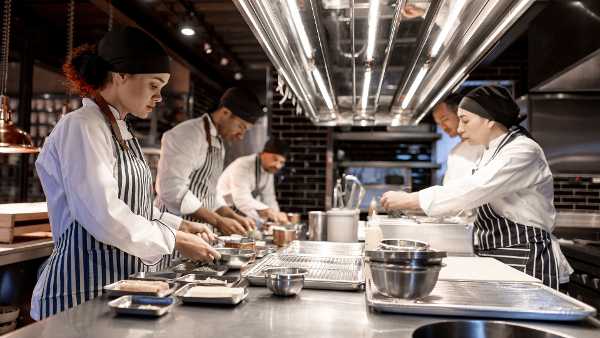What to arrange when you start a hospitality business

- Gerdine Annaars
- The basis
- Edited 2 December 2025
- 7 min
- Starting
If you want to start your own hospitality business there are many things you will need to arrange. A location, permits, insurance and more. Find out everything you need to know so you can be well-prepared to start your 'horeca' business in the Netherlands.
What do you need to do and arrange when starting a business?
Find out with the 'Personal to-do list' on Business.gov.nl. Answer the questions and see the steps that are important in your situation.
You often hear that times are tough in the hospitality sector. Prices of energy, staff, and materials have gone up. Many hospitality businesses struggle to find staff. Still, the number of businesses is growing. On 1 January 2024, there were 53,236 hospitality businesses registered with KVK.
| 2020 | 49.919 |
| 2021 | 51.225 |
| 2022 | 52.799 |
| 2023 | 53.315 |
| 2024 | 53.236 |
Location and premises
The key to success is choosing the right location. Opening a restaurant on a street where there are alreay 10 similar eateries can be difficult. Hospitality brokers like Funda in Business and Misset Horeca (in Dutch), your municipality's business desk, or your local shopping district manager can give you the details of businesses for sale, as well as vacant or soon-to-be vacant properties. A Koninklijke Horeca Nederland (KHN) regional manager can also assist you.
Check the following things before you sign a rental or purchase contract:
-
Are your intended activities allowed under the local environment ? Do the online permit (in Dutch) to find out.
-
How much will you have to pay to remodel or furnish the space so that it complies with the energy-saving obligation?
-
Are the price, term, and conditions negotiable?
If you need help, you can hire a hospitality broker or a lawyer.
Brewery purchase obligation
Is the owner of the property a brewery? Then you usually have an obligation to purchase: you must order your beer from that brewery. Negotiate the purchase price before signing the contract. After the contract has been signed, this is often no longer possible.
KVK Company Counter
Find out how many hospitality businesses there are in the area where you want to start your business with the KVK Company Counter. Or to find out which region would be most suitable for your business.
Applying for licences and permits
If you start in the hospitality business, you will soon have to deal with laws and regulations. Think of the Environment and Planning Act and the Alcohol Act (formerly the Licensing and Catering Establishment Act). You will also usually have to apply for permits. A licence is official permission to do something. A hospitality establishment operating licence, for example. You need this when guests eat and drink in your business.
Contact the horecaloket (hospitality sector desk) or the municipality's hospitality adviser. Tell them about your plans and ask what permits you need. It can take weeks or months to get the permit. If you make a mistake when filling in the application form you run the risk of having to start all over again. So it is useful to know in advance exactly what information the municipality needs from you.
Costs of hospitality licences
The costs of a hospitality licence vary from municipality to municipality. For example, an alcohol law licence costs between €120 and €1,800. A licence to serve food and drink costs between €500 and €3,500.
Overview of licences and permits
Hospitality businesses often require a lot of licences and permits. To know where to start, check the overview of hospitality licences and permits.
Music rights
Music is a real mood creator in your hospitality business. But you can't just turn on Spotify. To make business use of music, you need permission: background music licence (in Dutch). What you have to pay depends on the number of square metres where the music can be heard. Not only in your business but also on the terrace.
Working according to the HACCP rules
HACCP stands for Hazard Analysis and Critical Control Points. They are rules about preparing and storing food safely. To prevent people getting sick from the food you sell.
As a hospitality entrepreneur, you must have an HACCP plan. You can make such a plan yourself, but most entrepreneurs use a hygiene code. That is a ready-made HACCP plan. If you work according to the rules of the hygiene code, you meet the HACCP requirements. You can order the hygiene for the hospitality industry from Koninklijke Horeca Nederland.
Registration with NVWA
You must also register with the Netherlands Food and Consumer Product Safety Authority . The NVWA checks whether you make and sell food according to the HACCP rules. You have a choice of:
- registration
- applying for recognition
- applying for a licence
For a hospitality establishment, registration is usually sufficient. Please note: you have to register with KVK and apply for before you can register with NVWA.
Social Hygiene diploma
HACCP is often mixed up with the Social Hygiene diploma. But the Social Hygiene diploma is about the rules for selling alcohol.
Hospitality glossary
When starting up a hospitality business, you will encounter a lot of jargon. Think of terms such as environment plan, precario tax, and Public Administration Probity Screening Act (Bibob). Check the hospitality glossary for English translations of Dutch terms with clear explanations.
Financing
To open your own hospitality business, you need money. This is often part savings and part borrowed money, for example from a bank. Do you want to apply for a loan? Then you need a business plan and a financial plan. An accountant can help you with this.
There are more ways to get money, e.g:
- microcredit
- crowdfunding
- Financing by an investor or supplier
Leasing
You don't always have to buy all the equipment for your business. Some items, such as refrigerators or dishwashers, you can also lease.
Register with KVK
Every entrepreneur is required to register with KVK. Make an appointment before you open for business. Before you come by to formalise your registration, complete the online registration form. Are you renting or buying a location? Bring a signed lease or sales contract to the appointment. And if you are becoming a franchisee, bring the franchise contract signed by both parties.
Registering before your business opens
If you are not yet open for business, you may already need a KVK number. For example, if you want to:
- apply for permits.
- renovate.
- purchase materials.
- sign a lease or rental agreement.
- apply for a loan.
Fortunately, that does not have to be a problem, as you can register with KVK in advance.
Hospitality training
Are you taking a catering course? That is good preparation for your own business. But a catering diploma is not compulsory to register at KVK.
Extra activities
When registering with the KVK, you specify exactly what kind of work you will do with your business. Also extra activities, such as delivering meals, taking part in festivals with a food truck, or selling home-brewed beer.
Starting together with partners
Many entrepreneurs in the hospitality sector start a business together with others. Arrange the collaboration well. Choose the right legal structure and draw up a contract. You can ask advice from a lawyer or civil-law notary. That way, all agreements will be clear and you can avoid problems.
Taking over a hospitality business
Taking over a hospitality establishment has advantages. The business already has customers and suppliers. And it is often easier to get a loan. Banks want to be sure you can repay a loan. If you take over a successful business, you are more likely to be able to repay your loan.
There are also disadvantages. Many licences are personal and so you cannot take them over. The operating licence, for example. Usually, the business has to close down until you have all the licences. Before you sign a takeover contract, discuss with the municipality which licences you need to apply for and how long that will take.
Becoming a franchisee
When you become a franchisee, you start your catering business under an existing brand or catering concept. You enter into a contract with the owner of the brand: the franchisor. And pay money to use the name and the catering concept. An advantage of this is that it is usually easier to get a loan, as the franchisor already has good contacts with a bank. You can also take advantage of the franchisor's name recognition and advertising and marketing.
There are also disadvantages. You must work according to the rules of the franchise so you cannot just implement your own ideas. And you pay part of your turnover to the franchisor.
Finding staff
You will probably need staff right from the start of your business. There are several ways to arrange this:
- hiring staff
- working with an online supply and demand platform
- using a temporary employment agency
- hiring freelancers
Making staff co-owners
More and more hospitality bosses are making their staff co-owners of the business. It is a way of rewarding good staff. For example, you can give your staff shares. When you start your business, you need to prepare for this. For example, choose a legal structure that allows you to issue shares. A civil-law notary or accountant can advise you on this.
Hiring a foreign student
Would you like to employ a foreign student in your hospitality establishment? Students from an country or Switzerland can work in the Netherlands without any special requirements. However, there are (in Dutch) for students from other countries, such as a work permit (TWV) from the Employee Insurance Agency (UWV).
Hiring underage staff
There are rules about working (in Dutch) for personnel under the age of 18. They may work fewer hours than adult staff. There are also rules about the kind of work minors are allowed to do. For example, someone under 16 is not allowed to deliver meals.
Alcohol law
Young people under 16 are not allowed to work in places where you serve alcohol. This does not apply to 14- or 15-year-olds doing an internship in your business.
Keeping records
Yiu are legally required to keep business records. This can be quite a complicated job. The Tax Administration's Dutch-language tool for hospitality helps you get started. In 3 steps, you get information on:
- Checkout: what is a good cash register system?
- Keeping records: what is the best way to do that?
- Storing records: what, how and for how long?
You can do your own administration and bookkeeping or have it done by a bookkeeper or accountant.
General information for starters
As well as the topics above, as a starter in the hospitality sector you will also have to think about:
- writing a business plan
- choosing a legal
- choosing a business name
- paying tax
- limiting your risks
- networking with other entrpreneurs, for example
- finding suppliers


